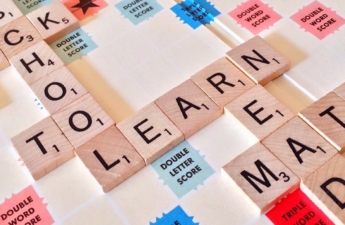
And these words that I command you today shall be on your heart. You shall teach them diligently to your children, and shall talk of them when you sit in your house, and when you walk by the way, and when you lie down, and when you rise.
[Deuteronomy 6:6-7, ESV]
What’s really important? What do we really want our children to know, to understand?
I don’t think most of us would hesitate to spew out the correct answer–the things of God, the fear of God, the worship of God; to know God.
I’ve been extremely bothered lately by the realization, however, that when it comes to academics and education, most of us are right there with the rest of the world in holding forth the “Three R’s” as our goal. But the most valuable thing the world has to offer is infinitely less than the smallest morsel of the knowledge of God. It is better that they grasp an ounce–a very grain!–of His truth than that they be the most accomplished in all their field of academia.
I tweeted earlier that there’s something wrong with our priorities if our children can discuss Hamlet better than Zephaniah, if the words “to be or not to be” come more readily to their lips than “The Lord has taken away the judgments against you; he has cleared away your enemies. The King of Israel, the Lord, is in your midst; you shall never again fear evil” (Zeph. 3:15) or any of the rest of that amazing passage, or any passage at all that has fallen from the pen of the Almighty God.
Shakespeare was a linguistic genius in whom we can see how much greater must be the genius of the One who created him, and yes, there are moments of truth to be found in the bard’s many lines. And Shakespeare is just one poignant example. But do we really want to say that a good understanding of Shakespeare makes our children more “well-equipped” than the armor of God (Eph. 6:14-18) does?
I am struck by the detail and intensity of the passage in Deuteronomy. I realize that the context is different from ours (in the sense that it’s talking about the law, and talking to a theocratic nation), but here we have a tiny, graphic picture of how God thinks people should be teaching children about Him: first by ourselves loving God with all our heart, all our soul, all our might, by writing His words on our hearts then by talking about His words when we sit, when we walk, when we lie down, when we rise; by carrying them with us always and holding them before us always.
That when-you-sit-walk-sleep-wake-up part really gets me. Be talking and thinking and meditating on God all the time! And in case we start to think that “all the time” just means some vague incomprehensible thing like we chalk up “pray without ceasing” to be–He spells it out. Talk about God with your kids when you sit down, when you walk, when you go to bed, when you rise in the morning.
I don’t think it’s wrong to teach Shakespeare and Hamlet. I pick on Hamlet, in fact, precisely because British literature was always “my” subject–I even did my undergraduate senior seminar on Shakespeare. But I’m really concerned with the division of time that we plan to use with our kids. I’m perplexed at the idea of spending hours a day in pursuit of things the world deems educationally important (reading, writing, arithmetic) and not spending those hours in equally formal, dedicated, focused pursuit of God and His words. I look at passages like the one in Deuteronomy and I fall so short. I am so completely saturated by worldly ideas about what things to teach our children, even toddlers. Have I tried harder to teach E the alphabet and numbers and shapes than I have tried to teach her Christ? Would that our catechism was offered with half the enthusiasm and desperation with which we present grammar and addition!
We think that our children need a good education, to be well-rounded and intelligent individuals who are well-prepared for anything the world might throw at them, including college.
They need Jesus infinitely more, and I don’t mean just a “saving knowledge.” He’s our bread and water and life-giving sustenance: we need every morsel. And that’s no small amount of learning–no small amount of training–no small time investment.
It’s a lot more than Shakespeare.



